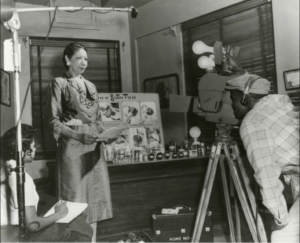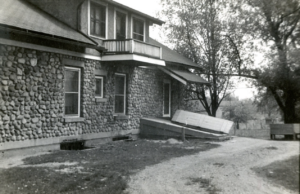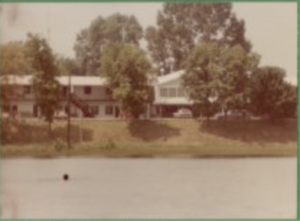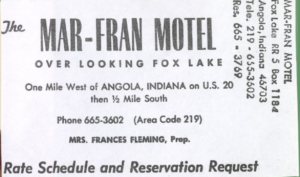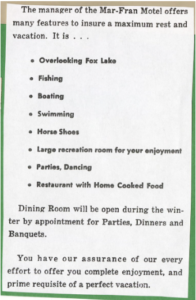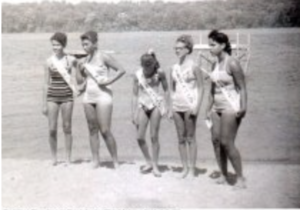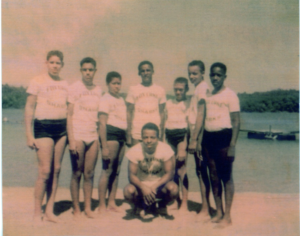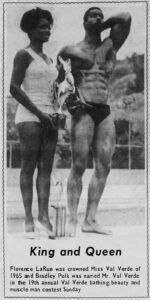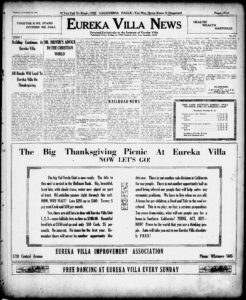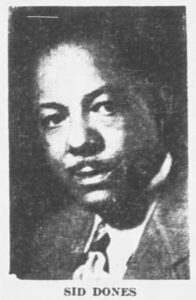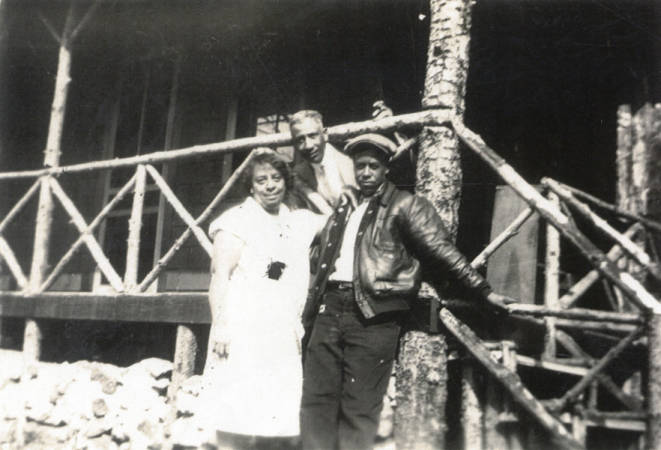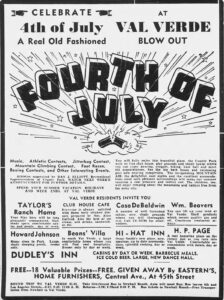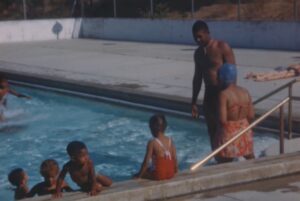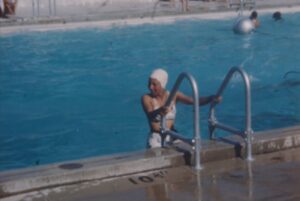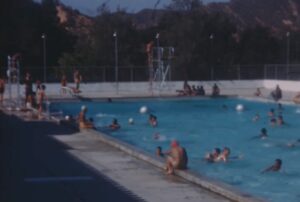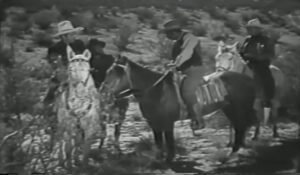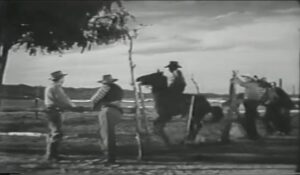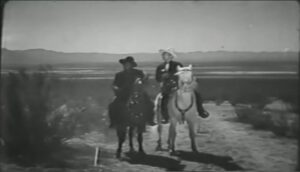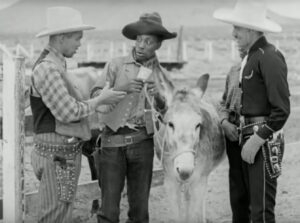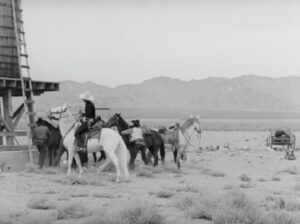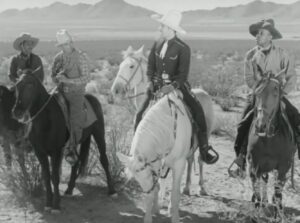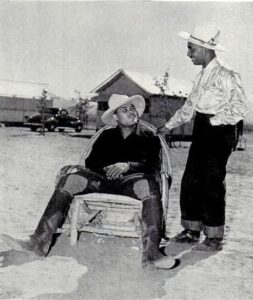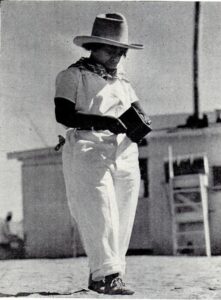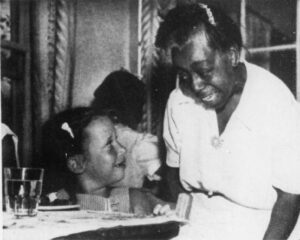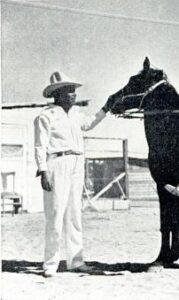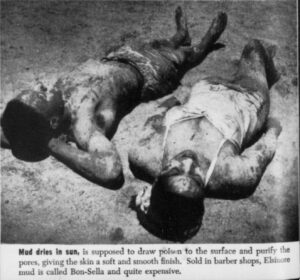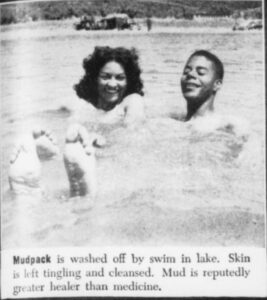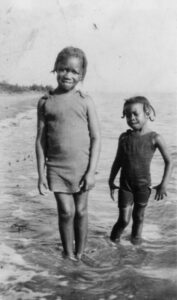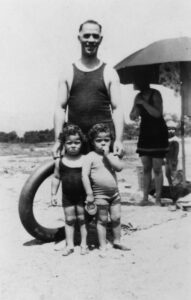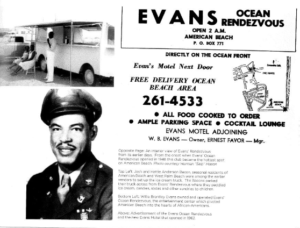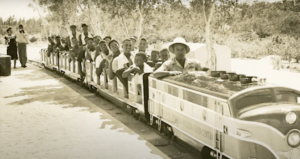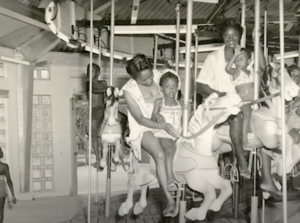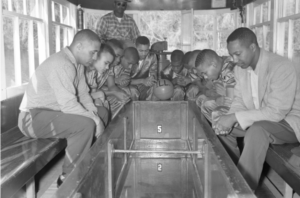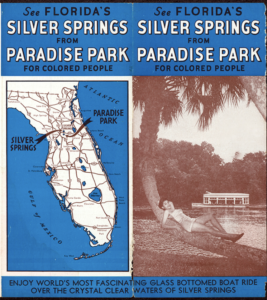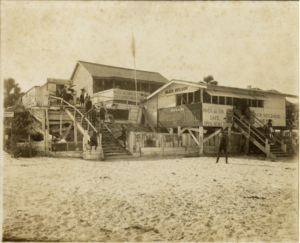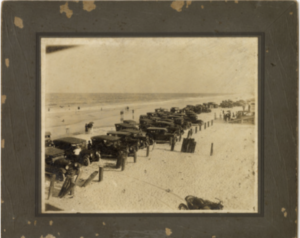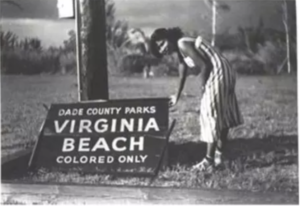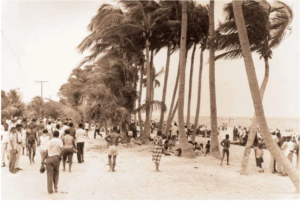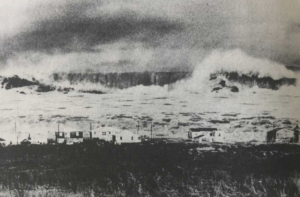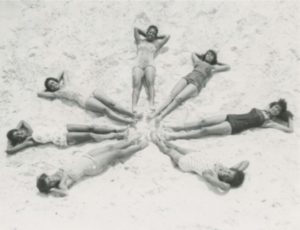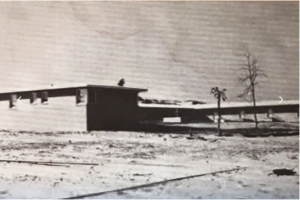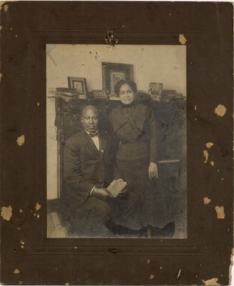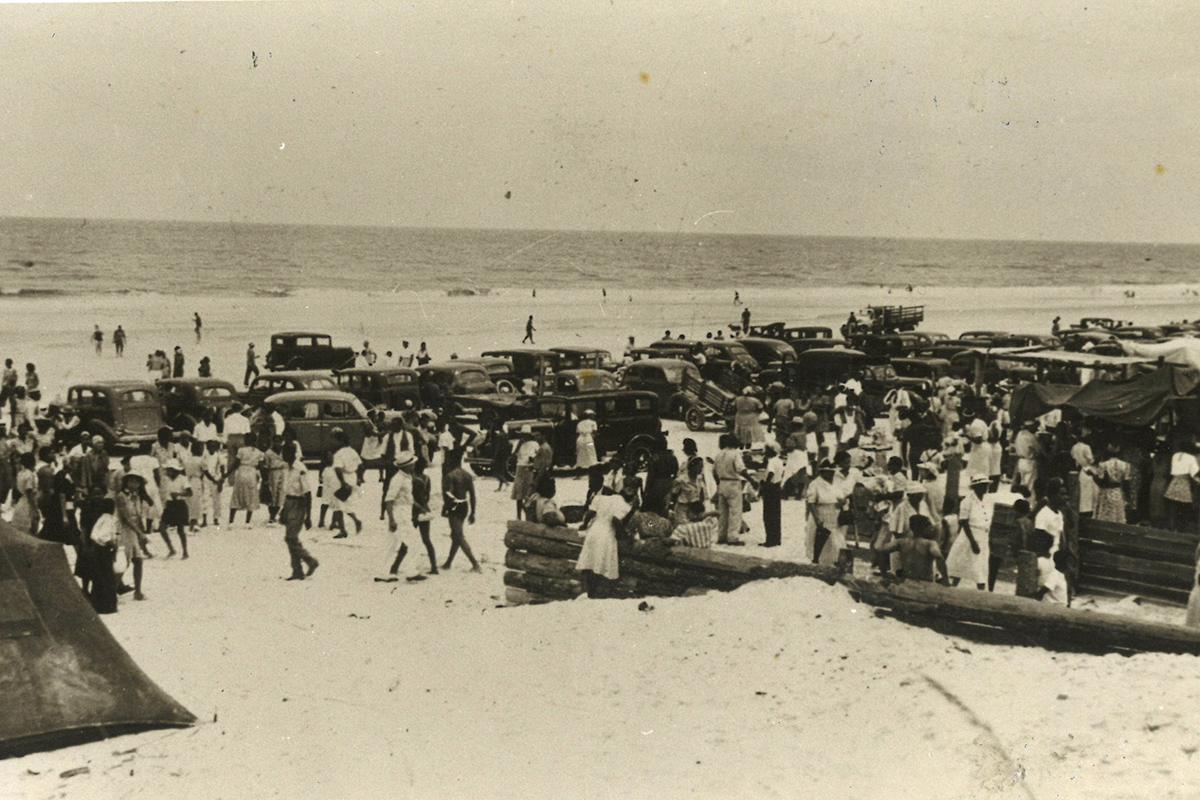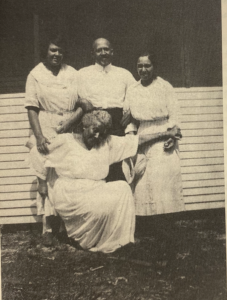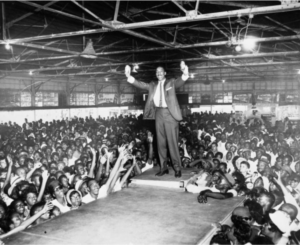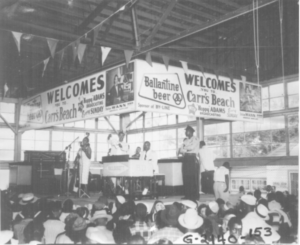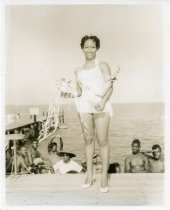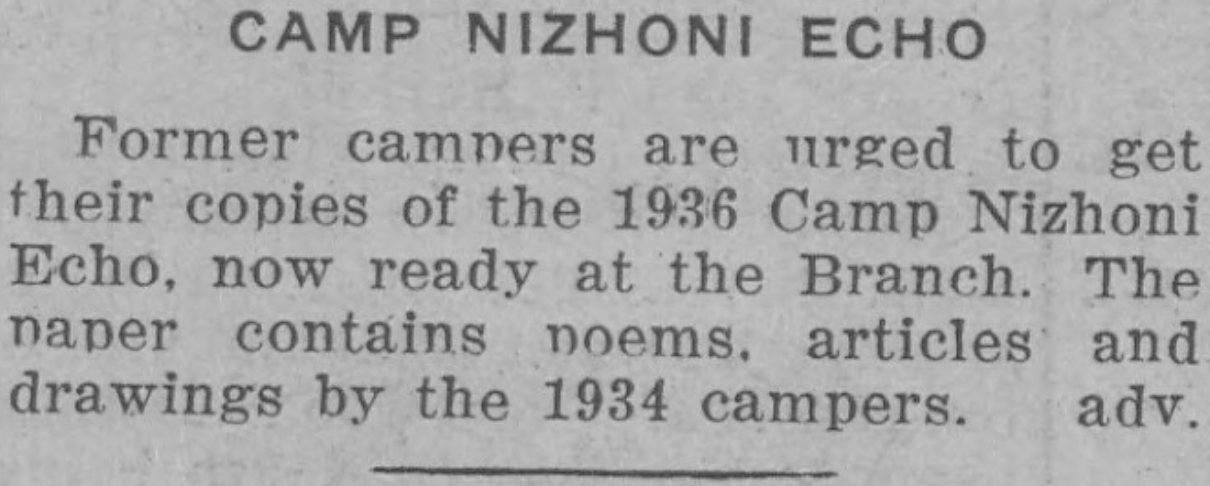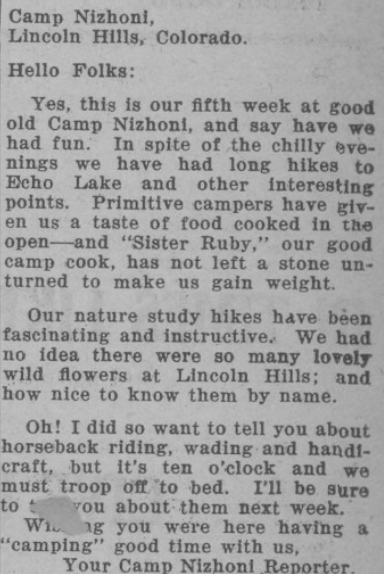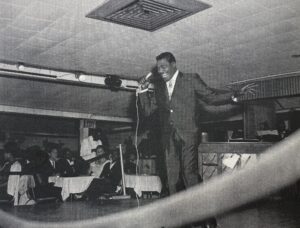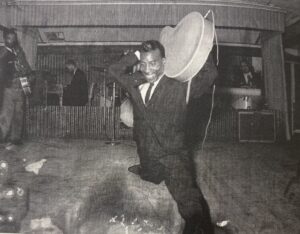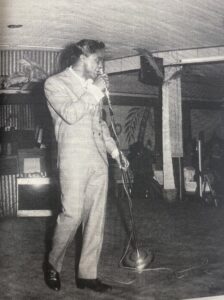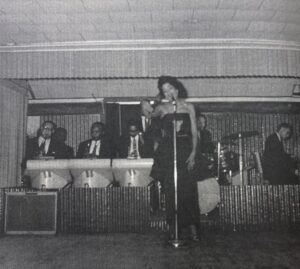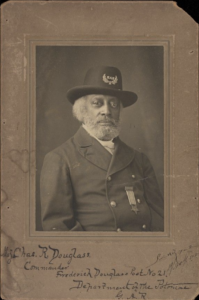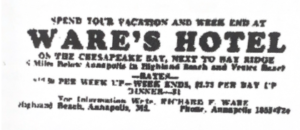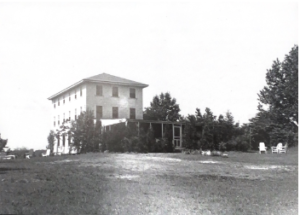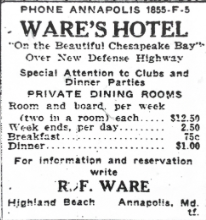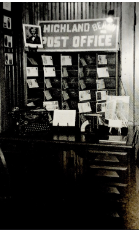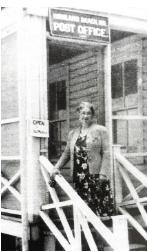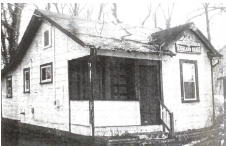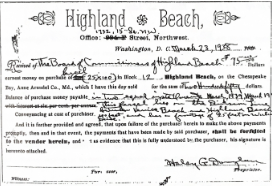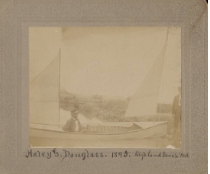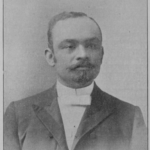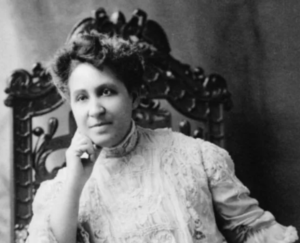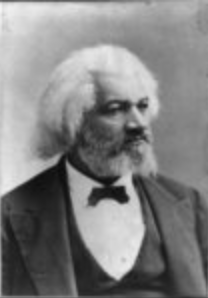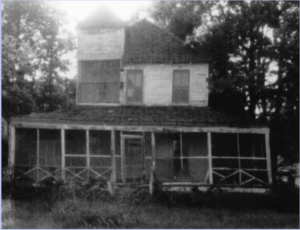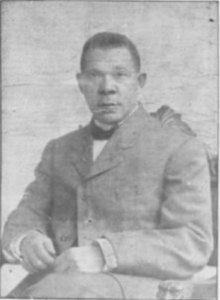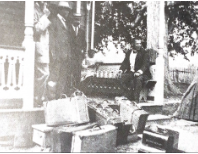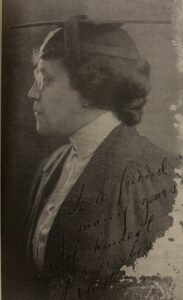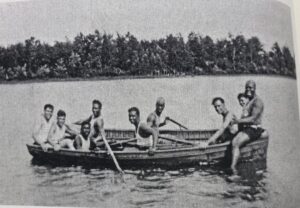
Fox Lake, Indiana
Fox Lake of Angola, Indiana, was the first and only resort for African American families in the state. Fox Lake was established in September 1924 when four white, Indiana-based businessmen purchased the land through the Fox Lake Land Company. Their goal was to market the land to the growing African American community and create a safe place for travel. Fox Lake is located in northeastern Indiana, but drew visitors from Fort Wayne and Indianapolis, and as far as Toledo, Detroit, and Cincinnati. The “hilly moraine” surrounding the lake developed rapidly, catering to the increasing demand for amenities.1
Wilson Road, named after Carl Wilson Sr., was the first dirt path cut in 1927, bringing in the first visitor, Violet Reynolds. During the 1930s, amenities such as Pryor’s Country Place, Ye Old Fox Lake Hotel, Woods Motel, and Mar-Fran Motel became available to visitors. Pryor’s Country Place and the Mar-fran Motel were the only two locations in Angola that were featured in The Negro Motorist Green Book. Although both were safe places for Black families to stay, Pryor’s Country Place mainly attracted wealthy homeowners through its lively entertainment and secret speakeasy. By 1936, Fox Lake had electricity, followed by the formation of the Property Owners Association, which began collecting funds for trash removal and road maintenance in 1938. In 1952, the Property Owners Association was finally incorporated, allowing owners to prepare for a growing town.
The development of Fox Lake was swift and lively the entire time. Between Sunday School and the basketball hoops, there was always something for the visitors to do. Many Fox Lake visitors would spend their summers fishing, so much so that it was a frequent feature of the Fox Lake Newsletter. John Metzger was recognized in the October 1965 edition for his “sensational” catch of a bass weighing four pounds and measuring 19 ½ inches long.2 Other popular activities included trap shooting with the Pioneer Gun Club and squirrel hunting (they even had to create a limit of five squirrels per day!). Once a week, residents and families vacationing at Fox Lake would get together at the restaurant in the Mar-Fran Motel for family night, which became a “Fox Lake institution.”3 A highlight of summer was soldiers stationed at Baer Field picnicking on the beach during their rest days. The Sharkettes and The Sharks were part of the Fox Lake Swimming Club, which engaged the younger crowd, especially during swimming competitions. The Labor Day Festival was one of Fox Lake’s greatest attractions. In 1965, the theme was “The Art of Swimming and Boating,” chosen by lifeguard, Mary Oglesby.4 A typical program for the festival started with an opening number, followed by various swimming competitions, performances of water ballet, diving techniques, or motorboat skills, and ended with a final motorboat parade.
Members of the Fox Lake Historical Society are actively trying to protect the spaces once used for Black leisure. There was once a dancehall, a bathhouse, and a pier that no longer exist because Fox Lake, along with many other places for Black leisure, were overlooked for many years. The Fox Lake Preservation Foundation was established to prevent further loss of the spaces that hold significance to the current residents’ families. Fortunately, the town continues to thrive through its residents’ histories and photographs. In 2021, Fox Lake was recognized by the Indiana Historic Bureau, and in 2022, a land marker was placed to display the history of the town. The recent documentation of the town reminds us of how important leisure spaces, like Fox Lake, were during the Jim Crow Era.
1“Living History.” Fox Lake Preservation Foundation. Accessed October 19, 2023. https://www.foxlakefoundation.org/history.
2Fox Lake Newsletter, October 1965, Spears Family Collection, Indiana Historical Society.
3Fox Lake History, 1925–1965, Spears Family Collection, Indiana Historical Society.
4Fox Lake Newsletter, October 1965, Spears Family Collection, Indiana Historical Society.
“Fox Lake History 1925-1965.” Indiana Historical Society. Accessed October 19, 2023. https://images.indianahistory.org/digital/collection/p16797coll72/id/1022/rec/5.
“History of African American Resorts – Lake County Star.” History of African American Resorts, February 20, 2013. https://www.lakecountystar.com/local-news/article/History-of-African-American-resorts-14387282.php.
Robinson, Angelica. “Hidden History: Fox Lake Grew from Era of Racism, Segregation.” WANE 15, February 12, 2018. https://www.wane.com/black-history-month/hidden-history-fox-lake-grew-from-era-of-racism-segregation/.
“Saving Places That Tell the Story of Indiana’s Black History.” Indiana Landmarks, April 29, 2021. https://www.indianalandmarks.org/2021/04/saving-sites-rich-in-african-american-heritage/.
Sharp, Joel, and Emma Cieslik. “Pryor’s Country Place, Fox Lake.” Ball State University. Accessed October 19, 2023. https://www.digitalresearch.bsu.edu/digitalcivilrightsmuseum/items/show/102.
Swartz, Mary. “Fox Lake Resort.” Ball State University. Accessed October 19, 2023. https://www.digitalresearch.bsu.edu/digitalcivilrightsmuseum/items/show/65.
List of Images
- Cover photo from the Indiana Historical Society, M0488
- Original map photo courtesy of the Wells Library Map Collections, Indiana University, Bloomington, Indiana
- Feature photo from The Indiana Album
- Feature photo from The Indiana Album






